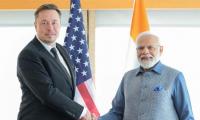With the emergence of the smartphone and the internet on the horizon of the 21st century, everyone (at least those associated with print and electronic media) imagined a world different from what it had been when George Orwell was writing his dystopian fiction, ‘Nineteen Eighty-Four’.
They saw the end of the monopoly over information flow and state censorship on what can and cannot be published. But this euphoria over freedom of expression in all forms seems out of sync with the reality on ground today. The ubiquity of information has rendered the truth even more elusive and individual freedom more wanting.
George Orwell, the author of ‘Nineteen Eighty-Four’, was mainly concerned with and critical of how an authoritarian state creates fear through propaganda and other scare tactics as an effective way of stifling dissenting voices. His metaphor of Big Brother aptly described how the government of the day created conditions for manipulating people’s thought process (through the mechanism of the ministry of truth and ministry of love) about peace, freedom, and emotional attachment to the state.
On page 36, Orwell writes, “Thoughtcrime does not entail death; Thoughtcrime IS death” referring to someone greeting “To the future or to the past, to a time when thought is free, when men are different from one another and do not live alone – to a time when truth exists and what is done cannot be undone: From the age of uniformity, from the age of solitude, from the age of Big Brother, from the age of doublethink – greetings!”
Against the wishful thinking of George Orwell and his projection of the prevailing order in the then Soviet Union and elsewhere, the world today has become even more dangerous for truth and for those who believe in or promote it.
Social media, which many thought would break the shackles of pervasive social and bureaucratic controls, has created its own complex problems. The use of fake accounts on Facebook, Twitter, and other outlets, for spreading agenda-driven stories and news, has led to a kind of fake-ification culture.
Many states have now established special-purpose teams dedicated for controlling information/views systematically by creating their own fake accounts and trolling individuals. All this is justified in the name of 5th generation warfare which is a blend of conventional to unconventional, regular to irregular and information to cyber warfare, where poverty, economic deprivation and political injustice equalize the breeding ground for ideological anchors to effect state strength.
To fight this war, many states are trying to promote uniform thinking by limiting free speech. They believe that social cohesion and national integrity cannot withstand social media with its craving for multiple narratives.
Even countries as strong and freedom-loving as the US have comprehensive surveillance systems (the Big Brother, in Orwell’s terms) which monitor the flow of information on the internet and other communication channels. Individuals are tracked and watched at airports, shopping malls, checkpoints, and cyberspace about who they talk to, what they watch, what they write, and what they do. The new normal is to trade off liberty and truth for security (real or imagined).
In Pakistan, we have our own predicaments and fault lines – ethnic, sectarian and geostrategic – that have been historically used to justify actions.
So some of the key ideas of ‘Nineteen Eighty-Four’ seem to have become even more relevant today given the fact that our smartphones control us and social media enslaves us in many ways, starting from what we consume to how we think besides the omnipresent and omnipotent state agencies gazing at us all the time from different angles.
Inciting hatred and fear constitute the core creed which can be used during crises and political campaigns to restrict freedom. It should, however, be borne in mind that trying to chain the mind has always backfired. One should seek and find ways of unity in diversity rather than destroying diversity to create false sense of unity.
The writer teaches at SZABIST, Islamabad.
Email: dr.zeb@szabist-isb.edu.pk
The cases of Attabad Lake and Gwadar simply highlight the many tragedies that exist around the country
Reaffirming loyalty to democracy as a problem solver can be a good starting point
Unfortunately, Pakistani films and TV dramas have seldom ventured beyond domestic intrigues and love triangles
A woman walks past a building of the International Monetary Fund. — AFP/FileThe annual and spring meetings of the...
Late Benazir Bhutto's daughter Asifa Bhutto Zardari addresses the Christian community in Bihar Colony on January 23,...







